2nd January 2023
The Spokesmen Cycling Podcast
EPISODE 318: Chris Boardman explains Active Travel England’s Capability Fund
SPONSOR: Tern Bicycles
HOST: Carlton Reid
GUEST: Chris Boardman
TOPICS: Active Travel England‘s new £32.9m Capability Fund
TRANSCRIPT:
Carlton Reid 0:13
Welcome to Episode 318 of the Spokesmen cycling podcast. This show was engineered on Monday 2nd of January 2023.
David Bernstein 0:27
The Spokesmen cycling roundtable podcast is brought to you by Tern Bicycles. The good people at Tern are committed to building bikes that are useful enough to ride every day and dependable enough to carry the people you love. In other words, they make the kind of bikes that they want to ride. Tern has e bikes for every type of rider whether you’re commuting, taking your kids to school or even carrying another adult, visit www.ternbicycles.com That’s t e r n bicycles.com to learn more.
Carlton Reid 1:02
Happy New Year. I’m Carlton Reid and welcome to another year of the Spokesmen podcast, which has been coming to you non-stop since 2006. Amazingly, it’s now 2023 and on the first working day after the festive break there’s this here announcement about a new 39 million pound fund that plans to empower local communities to create people-friendly environments through design. Active Travel England’s new Capability Fund will, the words of the press release, “create a national network of experts to work with communities, enhance high streets and make regional roads safer for everyone.” Working with the willing, Active Travel England will be doing what urban designer Brian Deegan did so well in Greater Manchester and that’s engaging with people, asking them not whether they wanted to limit car use but what they wanted their streets to look like and how they wanted them to function. Brian is the Director of Inspections at Active Travel England and I teased Active Travel Commissioner Chris Boardman over whether the Capability Fund was a sort of cloning exercise, replicating Brian’s expertise in lots of local authorities … but first I asked Chris to explain a little bit about the fund and the announcement.
Chris Boardman 2:45
The emphasis is a lot less on encouraging people and more on enabling them. And then when you start digging into what that means some of its political some of its psychological. But a lot of it is capability behind the scenes. So the point of this and it sounds rather melodramatic, but it’s true: we need to build an army of engineers and local officers who are capable of delivering to a consistently high standard across a whole country. And this fund is part of starting that. So it’s to enable local authorities to make active travel even higher value than it already is by by creating in-house capability. So reduce their dependency on consultancies. And it’s the start of several large announcements this year to get people ready. So they’ve got a pipeline of schemes that we can start delivering consistently as we go forward. So active travel is it will become a mainstream part of transport.
Carlton Reid 3:49
You’re basically cloning Brian Deegan. So you’re creating lots of Brian-Deegan-type people in local authorities, is that kind of is that the template?
Chris Boardman 4:03
Yeah, well, Brian’s, obviously our director of inspection, and he’s worked for decades in this area and knows that both politically, and technically we’d right down to how high is a curb what is required to enable people within the laws of this country to get around easily under their own steam and feel safe doing it. So that’s why we we put them in that position. Now we need people like that in every council across the country, or every council that wants to, you know, they think the important bit that we’re also injecting here is choice. That’s what this is about giving people a genuine choice in how they travel, because one of those choices is underrepresented. And we need skilled people who can navigate the system. Now that the reason I said engineers and local officers or officials is because it’s different. It needs to be cost done for each local authority, what it is that they’re lacking some engineers but the the knowledge amongst local councillors on how to do it and how to how to conduct an effective consultation that takes people with you doesn’t exist. So the training is in a different space. Whereas somewhere else, they’ve got great political will, and they’re frustrated that they officers aren’t capable of delivering. So that that comes from years and years of knowledge. And over the next, while by the spring, we hope that we’ll have a package of training for all authorities to help them develop their capabilities,
Carlton Reid 5:41
is that the way it started? £39.2 million is that is that where the money is going on things like training up to make these mini like, Brian Deegans. And it’s like, you know, when you when you put money down for a brand new cycleway or new bus route, or, you know, a widening pavements, whatever, that’s capital, that comes out of one fund. But when you actually want to do stuff with council officers, that obviously comes out of a different pot, revenue. So is that what this is for, to fill in those gaps?
Chris Boardman 6:15
To a large degree, yeah. And the reason it’s, it’s slightly more opaque than that is because it needs to be customised. But ostensibly, is to create a national machine that produces a pipeline of high quality schemes across the country, and then need to be consistent across the country. So wherever you are, you are, you see, you see a sign with with a bike on it, or somebody walking and you know, you’re going to have a good experience. So this scheme is about creating that capability within all the local authorities who want to do it. And obviously, that’s a rapidly growing number for, I mean, for a lot of people because they simply can’t afford the status quo, or realising rather, that we can’t afford the status quo. So when people go, there’s, you know, there’s hundreds of millions for active travel, it doesn’t just design itself, that capability isn’t the map consistency is what we need, probably more than the quantum of cash, we, we actually need the consistency and the ability to design and deliver when cash is available.
Carlton Reid 7:20
So criticisms potentially, could be I’m not this scheme in particular, but just, you know, people want infrastructure first. So you kind of you’ve kind of got people who just say, Look, we just want infrastructure, forget anything that you know, is ancillary to that just give us infrastructure. And then the other criticism from from a totally different point of view will be these kinds of things aren’t a nanny status? And why do we need people to tell us how to cycle how to wear all these kinds of things? So so how do you, how do you square those two circles?
Chris Boardman 7:53
Well, the environment is, is everything, you know, we can dance around, we can look at all the stats about you know, we know that we’re inactive and costly health service a billion pounds a year and all of that. But the only thing the reason we’re gonna get on a bike or, or walk to school every day is it’s the easiest choice. And it feels safe, simple as that. And so did the job of active travel endurance is to strip away the noise and go, but what really makes a difference. And it’s safe space. Number one is safe, convenient routes, where I want to go continuously. And that’s what we have to focus on. Once that is there, then you can start giving people the tools to use that space. So by kind of schemes and really inject into bike training, bikeability training, specifically concentrated in the areas where you’ve created safe space. So the layers of things that are needed. But I’m tempted to use a metaphor of baking a cake really you need, don’t you need all the ingredients and you need them in the right proportions, and you need them added in the right order. You know, otherwise you just end up with with stuff that’s inedible or unusable.
Carlton Reid 9:04
Now, am I right to be thinking that this is not new money? So this isn’t a government announcement of this is a brand new pile of 39 million pounds, a big pile of cash, new, this is coming out of your existing budget and you’re just apportioning it?
Chris Boardman 9:20
Yeah, there’s no you know, there’s no disguising the fact that last year is the politics last year meant that things got slow down, you know, we had, we had three prime ministers in a matter of months, and behind them as a team of people and behind them as another team of people. So all of that changes in the decision making is, is slowed down. So we’re several months behind where we want it to be. But we’re now very much on the move. There’s been some great activity in the last few weeks. And we’re finally getting out a lot of the stuff that we wanted to do in active travel, I’m pleased to say is there very highly valued in inside the Department for Transport. And politically, there’s really good support for it now as well. So, as I said, I hope this this will be the first of several announcements over the next few months. This is the one that enables people to use and capitalise on everything that comes next. But no, it’s not new money. It’s part of the £2 billion dedicated funding that was promised in 2020. And now we’re actually in a position to start to, to utilise it and make sure it’s spent properly. I mean, to set up an entire business, which was Active Travel England to deliver that and make sure it is spent properly. It’s something that’s incredibly technical ask anybody who’s who started a business. So we’re well into recruitment, we’ve had to put officers in place, those are now open all of the mechanics of creating first a national machine that then can drive the regional machines. So it’s, it’s quite exciting, actually. And exhausting. I think it’s, it’s taken a long time to get here. But at last, we’re ready to actually start doing the job at pace. And consistently.
Carlton Reid 11:11
And how hands off or potentially even hands on is the DfT? How much leeway do you have, Chris?
Chris Boardman 11:18
DfT is an essential partner. I mean, we’re an arm’s length body, we choose how we deliver government’s policy, how we how we get this mission done, that’s down to us. But we have to interact with buses and trams and trains and national highways and department for health, even over a DCMS, you know, and my other role in Sport England, they’re also a statutory consultee in the planning system. So there’s so many partnerships, you we have autonomy in how we deliver the mission, but we have to work really closely with other people, if we, if we want to do it well, and forming those relationships is well underway. Now. I’m really quite excited and enthused, actually by the level of enthusiasm and desire to see change that we’ve encountered.
Carlton Reid 12:09
Is any of that to do with Jesse Norman? Or is there something that it doesn’t matter who the individual is you think this is baked in now?
Chris Boardman 12:17
I think it’s essential who the people are individuals are critical. I mean, if if I could have walked into parliament, and looked into into the rows of seats and said, right, pick a minister, then then Jesse Norman would have been it. We have we’ve known each other for several years. He understands politics very well, obviously, he’s done a considerable stint at Treasury, which is very helpful. And he actively asked for the active travel brief. And that’s really important that that you get somebody who’s chosen to be here who wants wants to make a difference. So it’s quite exciting. We’re really, really looking forward to working with him closely over the next year.
Carlton Reid 13:03
Potentially, this administration, as you said before, the we’ve had many changes within even this administration, but but going forward, every electoral cycles, you might have a different administration. So the building blocks you’ve put in place here, presumably, you considered would survive any change of administration, perhaps even be strengthened in a future administration?
Chris Boardman 13:33
Well, not wishing to, to sidestep your question. This, this should go beyond politics. This is for any administration, who purports to follow the evidence, until want to do the thing for a community, then this is where you end up. You know, I mentioned earlier that people are doing this because they’ve realised they can’t afford not to. Well, that’s where we started in Greater Manchester four years ago. What’s it cost you to travel as you are now? Can you afford it? And I think there’s been a turnover of people that we’ve worked with from officers to politicians, in the last few months, often have come at this fresh and gone ‘why are we doing this’? And then they realise, well, I have to, I’ve got climate commitments that we absolutely have to meet. We’ve got a health service that is, is being well, severely burdened, shall we say, by by inactivity, you know, one in six deaths in the UK is down to inactivity, and I mentioned a billion pounds and it costs nearly 8 billion pounds to the economy. You look at all of those, and then you follow the thread and you realise that active travel is a huge part of the solution. It’s the transport mode that punches above its weight. It’s a it’s a quiet but powerful industry that is growing, not necessarily because people think ‘I love cycling’, you might absolutely have nothing to do with cycling but they realise that there’s never been a more important time in history to allow people to get around under their own steam. So our supporters have amassed for different reasons. But they all end up in the same space because it’s the cheapest, quickest, most logical answer. So I would expect, fully expect and I’m highly confident that the active travel agenda will just get stronger and stronger and stronger.
Carlton Reid 15:27
I’ll stop Chris there for a quick message from this show sponsor from my colleague, David.
David Bernstein 15:34
Hello, everyone. This is David from the Fredcast, and of course, the spokesmen. And I’m here once again to tell you that this podcast is brought to you by Tern Bicycles, the good people at Tern build bikes that make it easier for you to replace car trips with bike trips. Part of that is being committed to designing useful bikes that are also fun to ride. But an even greater priority for Tern is to make sure that your ride is safe, and worryfree. And that’s why Tern works with industry leading third party testing labs like EFBE, and builds it bikes around Bosch ebike systems which are UL certified for both electric and fire safety. So, before you even zip off on your Tern, fully loaded and perhaps with the loved ones behind, you can be sure that the bike has been tested to handle the extra stresses on the frame and the rigours of the road. For more information, visit www.ternbicycles.com to learn more. And now back to the spokesmen.
Carlton Reid 16:44
Thanks, David. And we are back with Chris Boardman. Do you think your your time obviously in Manchester will cover this? There’s the answer to this. But do you think devolution helps with this going forward so that nine times out of the whole of of of the Tyneside region is going to have a Manchester style administration? So do you think those kind of localised regionalized administrations are going to be much more powerful going forward for for what you would like to see happen?
Chris Boardman 17:25
Yeah, well, the macro and micro are, I mean, this is this is huge change delivered at a very, very local level, you know, hyper local, this is me going out the front door to go to the shops, or to go to the train on the tram station. And that’s where the change happens. And then you scale that up. Now, the time in Greater Manchester, was invaluable. And it made me realise that local councillors are in charge of climate change, because you realise that if there’s a local councillor, and he’s got a majority of for somebody screaming in his face about removing the car parking space, and his job is to represent that individual who he knows and has known all his life, then if they don’t change, well, you scale that up and nothing changes. Therefore, you you know, climate change is severely impacted and health and all the other things that I mentioned. So we need to give that local councillor what they need to be able to go, Well, we’re going to remove that car parking space, but this is why it’s good for you. This is how I’m going to get you or hopefully this is this the method I’m going to use. So we arrive in the same solution, we both want the same thing. So it’s, you need to mesh the two things together. And devolution can very much be a part of that, I think, I think it needs to be to go further at the moment. I mean, that local politicians need the powers to do interact with the strategic road network. There’s work in the pipeline, as we know about pavement, parking all of these things. But devolution can very much be a part of it. And I was in Newcastle a few months ago and had a look around. And I saw the work that had been done to stitch bits and pieces together to make a cohesive network and, and the desire that was there. But without that local desire. It doesn’t happen. And just to add on. I mean, that’s one of the reasons that I mentioned earlier. This is about choice. If there’s a local authority or an entire region that has no interest in increasing active travel, then good luck to them. And we will not be forcing anybody to work, but we won’t. We won’t do things badly. So we will learn to use the overused cliche, we will work with the willing and create examples at such a scale that they become on a global and that’s already happening.
Carlton Reid 19:58
And these examples that you have to create via local authorities will come mainly from Do you think existing officers being trained up? Or do you envisage councils maybe actually creating jobs that take this on board,
Chris Boardman 20:16
It should report our support is proportionate and targeted, and there’ll be more on this and then in the next few months, but a local authority who has no, no trained officers doesn’t know how to conduct consultations, but is rocket keen to do it, then we’ll help them with training, excuse me. And with schemes that they can win up from where they’re at, at the moment, and we’ll try to help them grow as fast as possible. For those that are already, excuse me, like Greater Manchester to Birmingham, and the West Midlands in particular, who are already on the journey and already have people in place, I have the capability to deliver and I’ve learned a lot of the lessons, we’ll both will just say, hey, crack on, you know, the standards will check you meeting those standards, but crack on, and tell us what you need. Because we have to do it. If we’re going to deliver government’s targets of 50% of all journeys, cycled, or walked by by 2030, then we’re going to have to work with those that are already capable intensively, and we’re going to have to work with concentrations of people are, but that doesn’t mean that other areas that are just turning to this will get left behind, they absolutely won’t.
Carlton Reid 21:35
Because in the press release, it says the fund could see up to 1300 new green jobs created across England. So where are those jobs coming from?
Chris Boardman 21:44
Well, you have to design, you have to design and you have to consult all of those, all of that capability, which is why it’s called Capability Fund is generally people, you know, you, you need people to be able to go and speak to local communities and run a really effective consultations that help the people that design the network that they want. So we have to have a network of networks and a machine to create that. And this is a very personal thing, changing how people travel in region and giving them real choices, the ones that they that will actually change behaviour. And all of that is people. So I think that’s an underestimation. And that’s, you know that that’s specifically to dob with this fund and how it can be used. And it says up to because again, it’s a choice. And it’s quite possible, that that’s where all of this, this, this particular fund will go on engaging people officers capable of conducting all those tasks.
Carlton Reid 22:52
So urban planning courses and schools and what have you 20 years ago, wouldn’t have had a great deal of active travel in there wouldn’t probably even much bus stuff either, it would have been pretty much predicated on cars, cars, cars, cars, that presumably has changed over the last 20 years. And then the throughput of trained people we’re gonna get out of these courses and be much, much more aware of, of mode other than the car. Is that something that you’re seeing that you’re seeing that the old guard are falling away, and you have a new thrusting bunch of millennials perhaps, who are now wanting to change the world in the way that they’re the people who before changed the world, but for cars, and now changing the world but not for cars?
Chris Boardman 23:43
I think we’re we’re, we’re actually we are and have been on the same side. You have to bear with me with this one. What we haven’t realised it. And I think that’s that’s a key difference that certainly the learning in Greater Manchester, if if you say do you want to ride a bicycle? People say no. But do you want a place that’s quiet and you’d like to sit? And you can you can let your kids walk around on their own and or go to school? Yeah, I’d like one of those things. Would you like to save money by having one less car in the household? Not not driving, but but one less car? Yes. That’d be great. What would you need for that to happen? Well, I’d have to be sure the kids were safe. Okay. What would that look like? Well, you know, there’s no real fast cars everywhere. So lower speed limits where you live? Yeah. Yeah. And they’d have to get across the main roads. So you mean like crossings or well lit underpasses? Yeah. Yeah, those things. Okay. So you mean this? So, so that’s the key, I think, for me, is that we start to talk about the outcomes of all of this, we start to talk about what does this actually give me that I value in a language that I choose so that it could be money saved? It could be time saved, it could be easier life, it could be a better place to live, it could be something for my kids. I mean, you probably saw the piece on Kesgrave High School that we did a few months ago, I was just can’t believe was embarrassed the fact that we didn’t know about this place, you know, nine, eight to 900 kids every day 61% ride to school and we went, that’s got to be a mistake and to go to see it. If you actually talk about kids getting to school and being able to avoid bullying, because they don’t have to be kettled, on a bus after school, all of the benefits that this can bring, if you speak to people about that, then suddenly you’ve got common ground. And I think that’s absolutely critical here that we actually want the same thing. And we know that by the fact that when we introduce high quality cycling, and walking facilities in an area, give it a couple of years, and people would fight you tooth and nail if you wanted to take it away. So we know the majority want the same thing, just not everybody has realised it and doesn’t see it in the same way. So it’s it’s the way that we’re going. And there’s examples all over the world, maybe you’ll be very familiar with Paris, you know, which is, which is one of my favourite examples, because it’s not the most people travelling actively, but it’s the one that’s changing fastest. And it’s a it’s a society that’s close to ours. And seeing what’s happening there. And they, they play to another part of human nature, which is, which is positive peer pressure, really, it’s just a case of here’s somebody doing something and I’m feeling a little bit uncomfortable not doing it well, the more of those examples that we can create in our country, the better.
Carlton Reid 26:46
Going back, I mean, absolutely, Paris’s is kind of poster child for that. But going back to Kesgrave, Ipswich, my theory on that and it is just a theory out you can’t can’t pin this down was the United States Air Force dropped 2000 bicycles on that community in in the Second World War. And as far as I can tell it, it was the only United States Air Force or any military base that that just dropped so many bicycles out at one time. That must have, I posit, created a community of people riding around the the air force base, they must have then gone to the local pubs, but and that must have created a community of cyclists. And that’s why in the 1960s, the local authority decided to put those those those cycleways in for that particular school when it was when it was expanded. So just putting bicycles getting getting people with bicycles, I mean, maybe that’s even why by Paris, you know, with the Velib scheme, you get more people on bicycles, you almost don’t need many of the other things is just get people on bicycles?
Chris Boardman 28:00
Well, that would be true if you could introduce 1930s to 1960s levels of traffic at the same time, because that that, that that theory has just missed the fact that that that they started with much quieter and safer space. And I think if you dropped 2000 bicycles, now, you wouldn’t have much of an impact because people still wouldn’t feel safe, and they still wouldn’t want to go on a road with cars that are travelling fast around. So I think that’s the difference. I mean, the story of Kesgrave is definitely you know, worth exploring and local farmers. And when they sold the land. They they one of the stipulations was now to keep the network in place and build around it, not over it. And I think I’d have you ever been there?
Carlton Reid 28:46
Yes.
Chris Boardman 28:48
I mean, you’ll see it’s not perfect by any means. And it’s not shy. And there’s lots of shared use and all the things are not supposed to work. But it works because the core of it is there. It’s joined up, and it deals
Carlton Reid 29:00
Yeah, it’s a network. I think the word you said there before was that was the key there. It wasn’t isn’t just two or three cycleways beside a road. It’s a quite a dense network of very, very different kinds of facilities.
Chris Boardman 29:13
Yeah, and the underpass to get to the school itself is just horrible. The I guess 1980s on the past that, you know, volumes of people have made it usable, you know, the safety numbers, natural security,
Carlton Reid 29:27
and that was that was built in something like 1964, 65. So it’s because very early. Yeah, for what they were doing. Yeah.
Chris Boardman 29:35
And it’s, it’s horrible, but it functions. And I think that’s key. I mean, there’s a lot of lessons to be learned from that area. I was almost relieved to find that when we spread out I went on a tour down there for a full day and we wrote miles around the whole area that move away from that. That probably what is it 10 square kilometres and it’s very normal. Still very car dominated. And it was almost a relief, to be honest. But they’ve inherited something and then built on it, and made it work for them. But it’s just a brilliant test case of what happens when you give people what they need. And it’s great to have an example that’s not in London.
Carlton Reid 30:19
Hmm. What have I was Ipswich? About 50 miles out 45 miles out from London? Yeah.
Chris Boardman 30:25
Pretty easy train journey.
Carlton Reid 30:27
Mm hmm. Yeah, very much. So. Right. So this this announcement on second of January, do you think it’s technicall press will pick up on this rather than mainstream? What do you think is gonna happen with the announcement?
Chris Boardman 30:46
I don’t expect and don’t require it to be to be hugely newsworthy. I mean, it’s, it’s the start is to get ready for a sustained big push that’s coming throughout the year. And I think there’s bigger stories in the pipeline. So this is just a case of, we’re letting people know that there’s 32 million pounds worth of funding now available for local councils and local authorities to start getting ready to deliver a network of networks.
Carlton Reid 31:16
So people, I’m talking about people here as in the general population, can expect to be consulted. And and taken on board by Brian Deegan clones and asked what they want, which was what you were saying before about, you know, do you want this and it turns out to be that’s what they actually want. So we can expect much more localised planning on the ground, in certain areas?
Chris Boardman 31:45
I’m not quite sure that where the question was there, I think consultation is a big part of it, and the capability to run and good consultation. And harping back to Greater Manchester again, the best thing that we did that was give the pen to the people who lived there and said, Okay, first of all, you don’t have to draw anything, when you don’t have to do anything. But if you did, where would you go? And what’s in your way? And what would you do about that, and we helped them to design something that worked for them around their shops and local communities in places where they knew that they, and that ownership was absolutely everything. And that’s, that’s been witnessed across the country has been really effective when you give people a choice. And I mean, a genuine choice, including the choice to do nothing, you end up getting to the same space. But the choice is really important when you’re talking about people’s homes and their communities. And this one will be heavily weighted towards making sure that capability is there. And the training to be able to do that consistently.
Carlton Reid 32:51
That you talked about people’s homes, their residential road. There’s bete noire, I’m sure you come across it all the time in media interviews, when you get asked about this, but LTN low traffic neighbourhoods is absolutely seems to be the the most hated thing from from from, from some commentators, you know, that’s taken some sort of freedom away from them. But LTNs have got this reputation of inequity, in that you’re in effect, giving facilities to middle class people. And if you’re forcing the traffic, the motorised traffic away from residential streets, and people’s houses go up in value, etc, etc. But then you’re actually forcing the motor traffic to go on the boundary roads, which then makes it people live on those boundary roads, and they tend to be poor people live on those boundary roads. So displacement, how do you get around the fact that any measures to make it nicer for people to walk and cycle can actually make it worse for other people? Because it increases traffic on their roads, much traffic on their roads.
Chris Boardman 34:06
There’s, there’s no, there’s no solution. And God knows we’d all love one. There is no solution that says we’re going to change how we use our streets that is pain-free. And that’s why it takes political will. And that’s why political will is one of the things that we require. We know as we mentioned earlier, and you’ll be well aware of with the likes of Waltham Forest, is that once you’ve pushed through that for two years, if it’s a well designed scheme, or well considered, then people prefer it. And we know that 70% of the stuff that was done during COVID and attracted a lot of those headlines has been made permanent because people wanted to keep it and that hasn’t made headlines, the fact that actuallt Low Traffic Neighbourhoods or whatever you actually want to call them, it’s just local traffic management really, and traffic being managed for the type of roads that it is where it had been allowed to be repurposed for moving traffic is actually it’s a very sensible and, and just a standard thing to do. I mean, there’s lots of lessons I think to be learned. I’m not sure packaging them up into one big thing that’s visible, and it’s change all at once is necessarily the way to go. I think it can be done in stages. Rambling a bit here, but I think LTNs are, if you actually describe the content I mentioned earlier, the outcomes there most people agree, yes, I want that. Then there’s going to have to be, there’s going to have to be some compromise, if you want to induce to introduce choice back into society. And I think when you talk about choice of kids travelling to school parents with prams, this disabled, don’t feel that they have to travel in a vehicle all the time, because actually, the pavements work for them, they’re clear, the crossings are all in the right places, then all of those things people want, we need to make sure that this is portrayed as the this is what it actually gives you. This isn’t taking away, it’s actually given people something back that they’ve lost.
Carlton Reid 36:23
Can society, can British society, create this, this nirvana of people walking, cycling, taking the bus, all these different modes? Doing that more? Can you create that and have elevated levels of car use? Or do you have to have a reduction in car use to get the former?
Chris Boardman 36:51
I think you’re almost talking about the same thing. If you if you make space for your kids to walk to school, or ride to school or scoot every day, then you don’t need to drive them there. And that’s that’s where the chicken or the egg and where the pain comes as your the discomfort is that change over period, because you make the space and then the behaviour changes to make the space, then there’s not enough of it the moment places where it’s saturated, particularly at rush hour. A match that’s the political hump that you have to get over time. And again, it’s show that that change happens. And I think I think that’s the juxtaposition that’s where the political will is required for that first step where people don’t necessarily they’re worried about change. And they don’t can’t see the alternative until they’ve experienced it; a lot of people won’t change until they can experience something. And so to create that takes courage. And I think, just to go slightly sideways, where we often get it wrong. And we’ve actually been alluding to it subconsciously all the way through there is by we pose the wrong question. If we pose what’s the place you live look like forget cycling and walking, what’s it look like? And what would you give up for that? Or what would you change for that? Would you like to have one less car? And I think we need to really think carefully about the questions that we’re asking. So a counter question to the one you’ve just asked me was, what happens if we don’t? What happens if we don’t? Can we afford it? Do you like it? And I think that’s, that’s probably the underlying the most important thing is that we need to start asking the right questions.
Carlton Reid 38:46
So do you think you can get the Daily Mails — and I write for the Daily Mail — but do you think you can get the Daily Mails of this world onside and how?
Chris Boardman 39:03
I don’t know, is the answer. I’m not sure I should care. Because I, I can’t we have to spend time creating a message that’s attractive and asking the right questions. So you know, if we don’t do this low traffic neighbourhood how are you going to tackle climate change? Do you like it? And there’s there’s lots of things and wouldn’t you like your kids to be able to get around under their own steam? I think the asked constantly asking the right questions. You know, what happens if you win? What have you won? It is there’s there’s a there’s a raft of really good questions that make the nice thing about questions. They cut through emotion and connected with the person and make them stop and think and you won’t win them all. This is not this is not a an easy journey change. Culture change never is, it’s always slow, and it’s always painful. So the best way we can do it to come back to the start, is to work with those that are prepared to go through that first bit of discomfort. And take people through that slightly scary bit of change, and then create examples. And to hark back to Greater Manchester, again, when we went when we put our draft network online, way back in 2018 and asked people for their opinion, just put it out there and said, tell us what you think the biggest complaints were ‘where’s ours? Where’s our bit? They’ve got it, we haven’t got it.’ And that’s, that’s the kind of battle that you want. So I’m not I don’t think we we can and we should try to persuade everybody. We should just speak to the evidence and the evidence of outcomes that have been seen elsewhere and crack on. Because what happens if we don’t?
Carlton Reid 41:00
Thanks to Chris Boardman there and thanks to you for listening to episode 318 of the Spokesmen podcast, brought to you in association with Tern Bicycles. Links about the Capability Fund can be found on the show notes at the-spokesmen.com. The next episode will be with a Critical Mass campaigner looking to change hearts and minds through song … that show will be out soon but meanwhile, in 2023, get out there and ride.
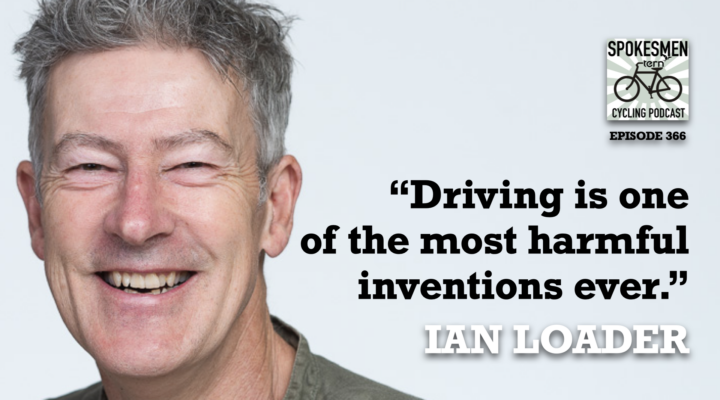
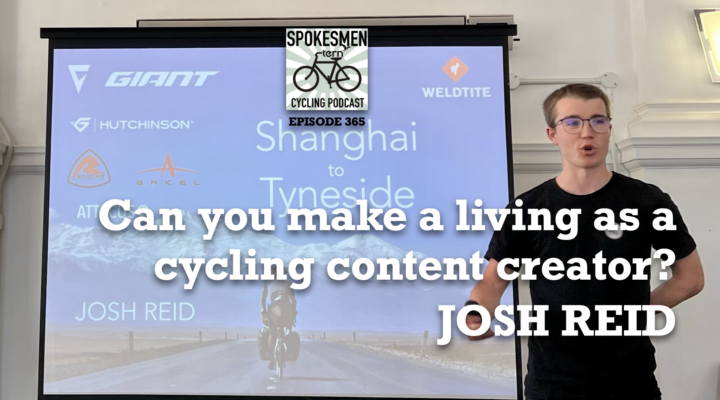
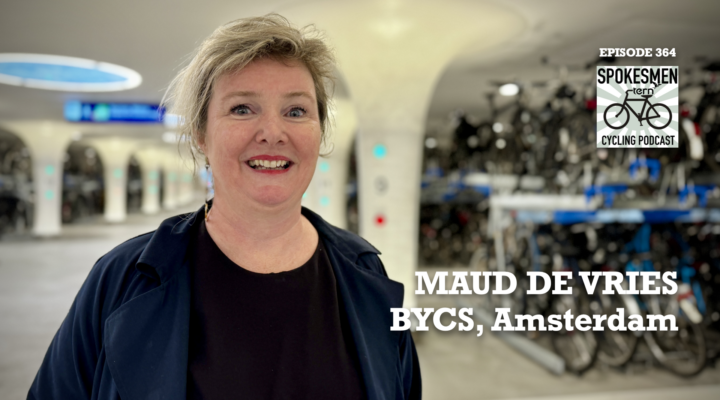
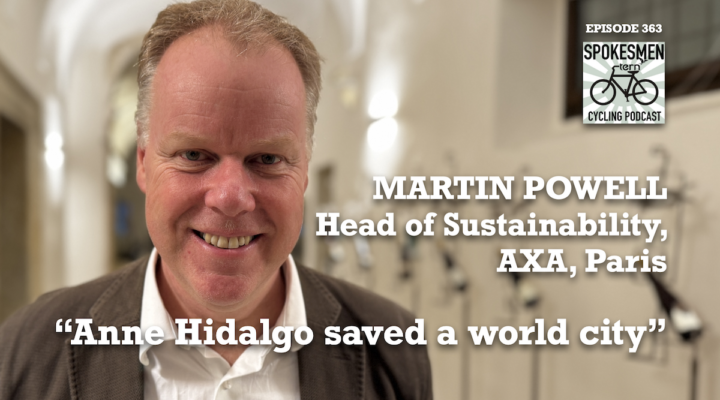
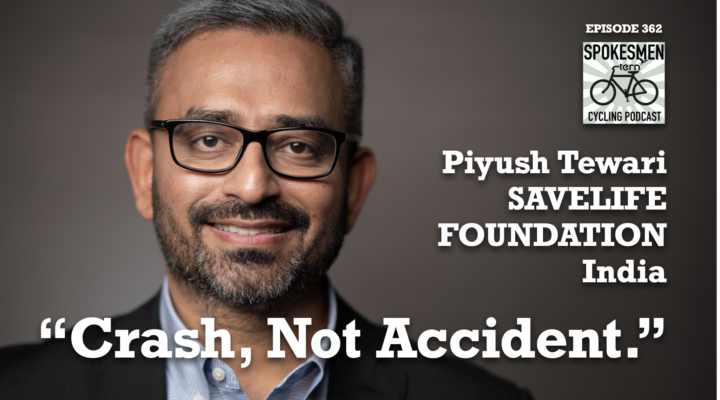
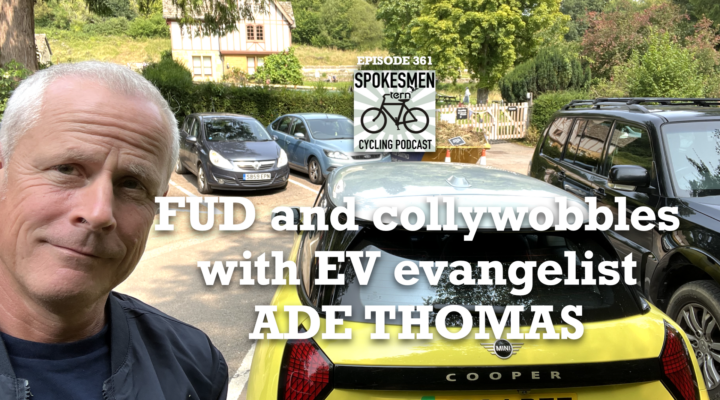
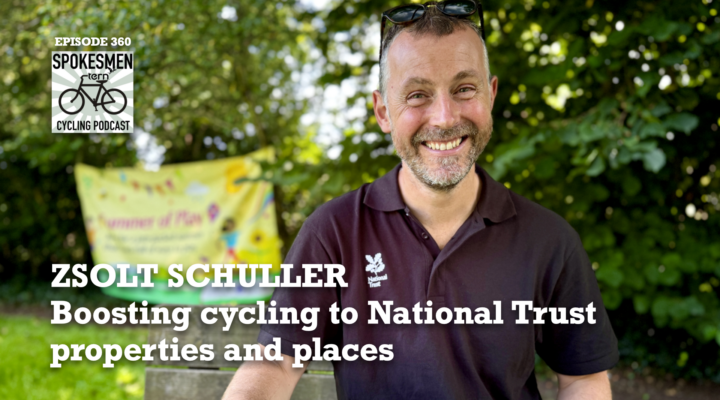
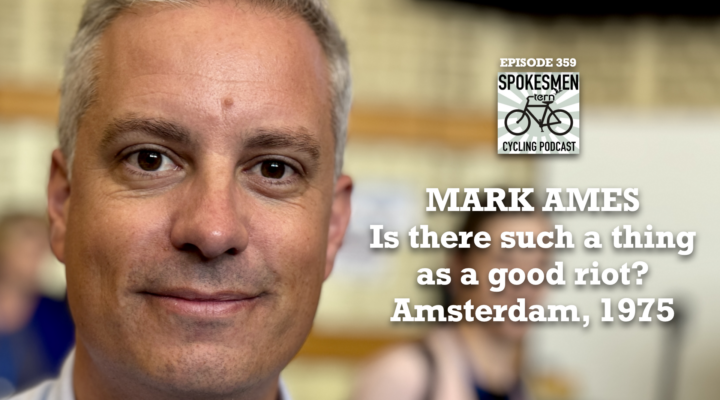
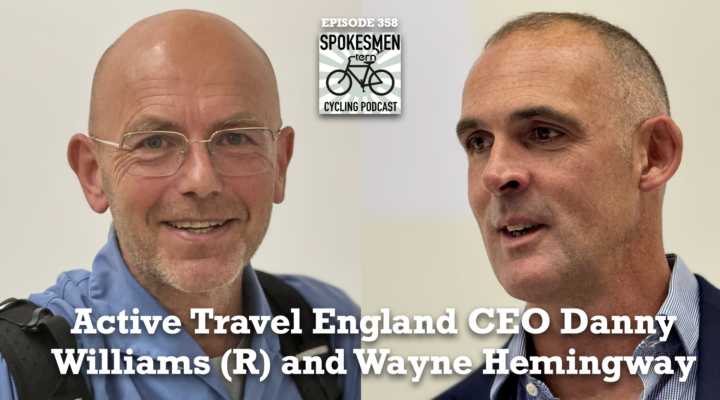
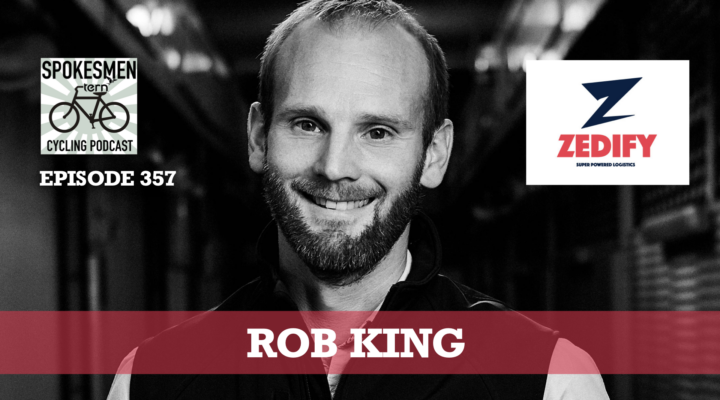
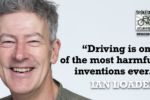

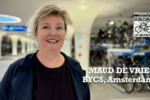
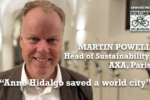
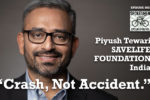
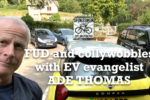
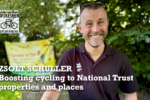
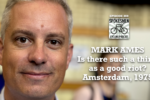
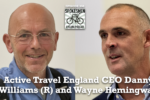
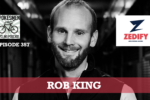
Be First to Comment